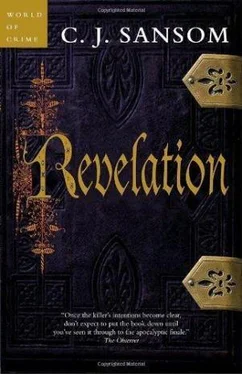'Lord Cromwell trained his men well.'
'He is a religious radical. I hope that doesn't cloud his investigative skills.'
'He seemed sharp enough to me,' Barak replied. I did not pursue the point; he was in a mood to turn discussion into argument.
We walked from Whitehall Stairs to Westminster again, through more squally rain; I was glad the day's court papers were secure in the leather panniers Barak carried. Instead of turning left into New Palace Yard as usual, we went under the gatehouse of the former abbot's prison into Thieving Lane. The rain had stopped, and patches of white clouds moved across a blue sky, sending shadows chasing each other across the ground below.
The Westminster streets teemed with people. Well-dressed MPs were walking to Parliament from their lodgings, harried unmercifully by beggars and pedlars. Some of the Members had been here long enough to develop the trick of waving a hand in dismissal without looking if someone approached, but one man in a fine red cloak and jewelled cap was being mobbed by a group of pedlars. He had made the mistake of trying to argue with one, and seeing an opening the whole group had flocked round him like starlings round a dropped cake. 'No, no, I said I don't want any of that stuff!' he called plaintively as someone grasped his sleeve. He lost his temper and began shouting, 'No! No! Go away, damn you, and take your rubbish!' A pedlar thrust a copper necklace in his face.
Barak laughed. 'Some country gruff. They'll eat him alive.'
I jumped back as a long iron knife was thrust in my face. It was another pedlar, a tray of ironware tied round his neck. A tall grey- bearded man, smelling mightily.
'Have a care!' I snapped.
'Fine steel knives, the very best, sir!'
I shouldered him aside and we went on. Harsnet was already standing by the ancient gatehouse, wearing a lawyer's robe embossed over the heart with the royal arms, his hands clasped behind his back as he looked up Thieving Lane. He nodded as we approached. I began by thanking him for sending Orr to my house.
'The women must be protected. And if the rogue does try to gain entry we have a chance to catch him. Orr is a good man. I hope your wife is not too badly hurt, Goodman Barak.' His face softened with genuine concern.
'A bit of rest and she'll be all right.'
'But what exactly happened:'
I told Harsnet about the attack on Tamasin. He set his lips. 'How can that have happened; We must talk further after we have seen the dean.'
'And you, sir?' I asked him. 'Have the neighbouring coroners reported any — any horrific murders like our three?'
'None. And we are still in the dark as to how our killer got to know those men, why he chose them.' He sighed, then essayed a tired smile. 'Well, let us see what Dean Benson has to say. I told him to expect us. He will be at the former prior's house, which he has taken over.' Harsnet frowned; a reformer would disapprove of an ex-monk benefiting from the Dissolution.
'One thing,' I said. 'Have you thought, this last week, that someone might be following you?'
The coroner shook his head. 'No.'
'I fear I have. I think you should take care, sir.'
'I will. Thank you.' He drew a deep breath as he led the way under the gate into the old monastic precinct.
THE OUTER COURTS of most Benedictine monasteries had long been places of commerce, but Westminster had been in a class of its own, partly because of its enormous size but also because of its ancient privilege of sanctuary. Those who were wanted by the law could move there and set themselves up beyond the reach of justice. Thus the house of God had been surrounded by villains evading retribution. The precinct was ringed with a mixture of fine houses and poor tenements, home to criminals of all sorts, all paying profitable rents to the monks. Most of the old privileges of sanctuary had been abolished by King Henry — one of his better initiatives — but the Sanctuary itself had survived the Dissolution, and debtors and petty thieves could still find refuge there. Some fugitives had spent a lifetime in Westminster Sanctuary, often living a comfortable life, doing business in London using lawyers like Bealknap as intermediaries, and going each Sunday to St Margaret's church, a fine, recently rebuilt building that dominated the northern part of the precinct.
As we passed the church, I noticed a little group standing outside, two of them clerics in white robes. 'Bonner.' Harsnet spat out the name. I recognized the feared Bishop of London, a squat, thickset, round-faced figure. He was laughing with the other cleric, perhaps the St Margaret's vicar. I studied the bishop who wanted to purge London of radicals.
'He seems cheery enough,' I observed.
'Vicar Brown is cut from the same cloth,' Harsnet said grimly. 'St Margaret's is still full of gold and candles and images; it was enough trouble to prise their relic of St Margaret's finger out of them. That porkling of the Pope would have us all back to Rome.'
'Yet Bonner was once Cromwell's man,' I said.
'Now Cromwell is dead the wolves cast off the sheep's clothing they adopted to keep in favour.' He glared at the bishop. 'God forgive me, I wish our killer would aim at Bonner, not good reformers. But the devil looks after his own.'
I looked at Barak. He shrugged. We walked past the huge old bell-tower, now converted into ramshackle tenements, then turned east, under the looming shadow of the abbey church, into the southern precinct, bordered by the great monastery walls.
AROUND THE SOUTH PRECINCT there were more houses, mainly poor tenements for pedlars and jobbing workers. Men were outside their houses loading carts with produce and otherwise preparing for the day. There was a smell of resin in the air, for there were many carpenters' yards at Westminster servicing the abbey and Westminster Palace. To our left a high wall separated off the inner precinct containing the monastic buildings; the gates that had once sheltered the monks' comfortable lives from the world stood open, though a guard with a pike stood outside. Harsnet told him who he was and we were allowed through the gateway, into a yard full of monastic buildings in the course of demolition or conversion. All around, workmen were sorting hammers and picks from their carts before starting their day's work. We walked to a large attractive house that stood amid the ruination in a little crocus-filled garden of its own. Harsnet knocked at the door.
A servant answered and bade us enter. Like Cranmer's secretary he asked Barak to wait in an anteroom, ushering Harsnet and me into an office furnished with rich hangings and dominated by an enormous oak table strewn with papers. I wondered if these things had come from the monastic buildings. The choir stalls covered with cushions standing against one wall certainly had. Outside the sound of hammering began.
The door opened, and a short man in white cleric's robes entered. We exchanged brief bows, and he walked to take a seat behind the table. 'Please, gentlemen, be seated,' he said in mellifluous tones, waving us over to the choir stalls.
I studied William Benson. The last abbot of the monastery, a monk who went over to Cromwell and had been put in the abbot's place to hasten the Dissolution. The deanery of the new cathedral was part of his reward. A stocky man nearing fifty, he had a plump, deceptively sleepy face, an air of contentment, ambition achieved.
'What can I do to aid the Archbishop?' he asked.
Harsnet spoke first. 'It is a most secret matter, sir. The Archbishop charges that nothing be said outside these walls.'
'Nor will it be. My duty is to obey my superior.' Benson smiled, looking between us with his sleepy eyes. 'You intrigue me.'
'I fear it is a very disturbing story,' I added, feeling I should stake some claim to authority.
Читать дальше












